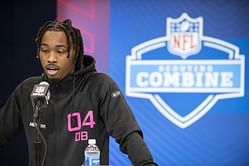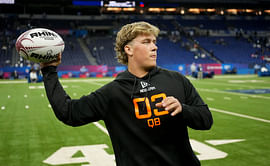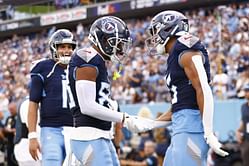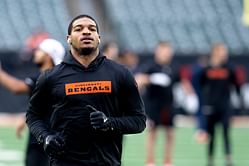
Watching a sporting event at a stadium is a completely different experience altogether than watching it at home. Going to a stadium provides such a unique experience that lets one celebrate with thousands of passionate fans singing, dancing, and cheering all through the game. NFL teams boast of some of the best stadiums in the world. There is also a unique blend between some of the oldest stadiums dating back five to six decades along with some of the most modern and newest stadiums. That being said, even the older stadiums constantly go through renovation work and expansions.
Detroit Lions Home Venue
Ford Field is the home of the passionate Detroit Lions franchise in the NFL. The stadium is located in downtown Detroit, Michigan and has been the place the Lions play each year since the 2002 NFL season. Ford Field is actually a multipurpose stadium which is used not only by the Lions but for other sports as well.
The stadium has been named as Ford Field since the Ford Motor Company purchased the naming rights paying $40 million over a 20 year period. This stadium has a very unique seating approach as the design has incorporated a former warehouse. Ford Field is one of the domed stadiums in the league, but it allows a lot of natural light to trickle down towards the field because it has incorporated huge skylights and large windows.
Ford Field Capacity
The capacity of Ford Field is different depending upon the layout that is used. As different sports require different seating arrangements, the overall capacity changes accordingly. When the Lions are playing their games, the stadium can seat a regular capacity of up to 65,000 people but can be expanded to 70,000 during football games.
When the stadium is being used for basketball, it has a much larger capacity and seats nearly 80,000. The record breaking attendance at Ford Field was 80,103 on April 1, 2007 during Wrestlemania 23. The Ford Field is actually a downgrade from the Lions previous stadium which was the Pontiac Silverdome located in Pontiac, Michigan. That stadium had a capacity of over 82,000 during football games.
Ford Field Stadium History
The Ford Field broke ground on November 16, 1999 and was opened for play on August 24, 2002. It is one of the relatively newer stadiums in the NFL as the Lions previously played in the Pontiac Silverdome from 1975 to 2001. Even before 1975, the Lions played mostly in Tiger Stadium, which was also the home of the Detroit Tigers.
Since the Silverdome was located in the city of Pontiac, the Lions started searching for possibilities that would bring the team back to Detroit during the mid 1990s. It was decided to open a new stadium in the downtown area of the city and as per that plan, a large portion of downtown Detroit was revamped with Ford Field and Comerica Park (Detroit Tigers new home) being built side by side to each other.
Ford Field Construction and Cost
For Field began its construction in November 1999. The total cost of building the stadium was around $500 million dollars nearly twenty years ago. Since then, it underwent renovation in 2017. Being a domed stadium, it is still unique in a sense that a lot of natural sunlight comes in through the roof and large windows, but it only reaches the sidelines. The turf is mostly illuminated by artificial stadium lights and a little amount of sunlight so as to not cause a distraction to the players.
Since the stadium incorporates a former warehouse, most of the suites are located inside the warehouse along the southern sideline as well as the premium club seat lounges which are also on the south side. The Lions home is likewise one of the only stadiums in the league which has endzones on the east and west side.
The latest renovation which took place in 2017 included a new sound system, video boards, and updated suites. They also renovated several restaurants, bars, and clubs. This renovation cost was around another $100 million.
Ford Field Stadium Seating Chart
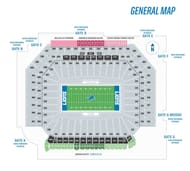
What to bring to Ford Field Stadium?
Safety and security are a big part of an NFL game with so many fans entering the field. Therefore, the stadium employs a strict policy on what items are permissible inside the stadium and which ones are not allowed. Moreover, all entryways to the stadium are fitted with walk-through metal detectors.
As per the rules of the stadium, fans are allowed to carry a clear bag with dimensions no more than 12 x 6 x 12 inches or a one gallon plastic freezer bag. Small clutch purses, small cameras, and small binoculars not more than 4.5” x 6.5” are also permitted. All other larger bags including large purses, backpacks, handbags, etc. are strictly banned from the stadium.
Medication, children’s items such as bottles, formulas are allowed upon inspection. However, diaper bags are not permitted. Compact umbrellas, handheld posters, battery operated clothes, and tablets are all allowed after inspection. A larger list of banned objects can be found on the official website of Ford Field.
What is the parking cost at Ford Field Stadium?
Whenever there are game days or event days, visitors are allowed to access the parking spots near Ford Field and Comerica Park. Generally, the parking spaces are opened four hours prior to the kickoff and are on a first come first serve basis. The charges for parking in Ford Field range between $20-$50 but the lots get filled up quite quickly on game days.
Additional parking is made available at Lot 4 on game days situated north of Ford Field as well as Ford Field Parking Deck which is to the east of the stadium. This area is available for guests that have disabilities and is on a first come first serve basis.
FAQs
A. The Detroit Lions play their home games at Ford Field located in Detroit, Michigan.
A. Ford Field uses FieldTurf which is a type of artificial turf that replicates real grass.
A. Ford Field is a domed stadium but is unique as it allows lots of natural light to enter the field through its large skylights and corner windows.
A. Ford Field was opened on August 24, 2002 after construction work started towards the end of 1999.
A. Ford Field has different capacity depending upon the sport. Football games generally have a capacity of 65,000 with expansion up to 70,000. Basketball games can go up to 80,000 in capacity.
